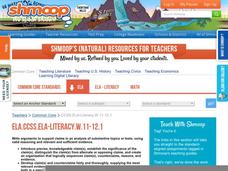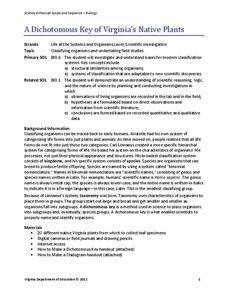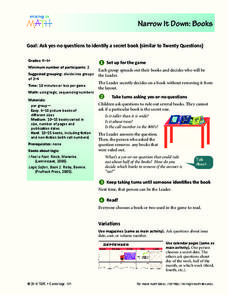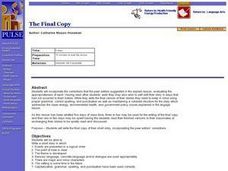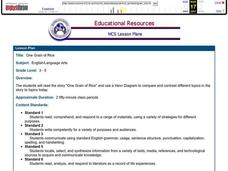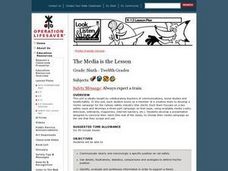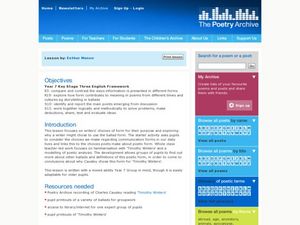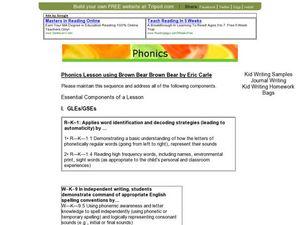Shmoop
ELA.CCSS.ELA-Literacy.W.11-12.1
Focus on writing argument essays with your high schoolers. The lesson suggested here focuses on The Jungle, by Sinclair Lewis; however, the idea could be adapted for other texts. Check out the quick quiz provided at the end of the...
Curated OER
Understanding and Using Root Words to Expand Vocabulary
Middle schoolers engage in a lesson plan which reminds them that root words indicate the base meaning of a word, and that those roots are found in many different words that have similar meanings. Pairs of pupils use construction paper...
Curated OER
Narrative Writing vs. Explanatory Writing
The class discusses the different purposes an author has for writing. The focus of the discussion is on writing to tell a true story and writing to give information about a specific topic. There are writing purpose sorting cards embedded...
Virginia Department of Education
A Dichotomous Key of Virginia’s Native Plants
Can your class correctly classify plant species? Individuals explore native plants of the local environment and correctly classify them into their respective categories. They investigate differences in the plants and discuss similarities...
Curated OER
Fire Escape Plan
Students explore fire safety. In this fire prevention and safety lesson plan, students discuss and brainstorm ideas about what to do if there is a fire. Students practice stating information that should be given when calling 911....
Curated OER
Narrow It Down: Books
Students ask yes-no questions to identify a secret book. In this asking questions lesson, students ask yes or no questions about books to identify a secret book. Students identify the book and then read one of the example books.
Curated OER
Layers Upon Layers - Lesson Plan
Young scholars study rock layers and the sequence of events that occur when a canyon forms. In this sedimentary lesson plan students complete a lab while in groups and discuss what happens.
Curated OER
The Very Hungry Caterpillar
Here is a good lesson on butterflies and caterpillars. After listening to The Very Hungry Caterpillar, young learners put cards that depict the life cycle of a butterfly in the correct order. There are some good ideas for center...
Curated OER
Challenge Your Middle Schoolers with Mathematical Strategy Games!
Help learners develop the ability to think logically and mathematically, in a really fun and engaging way.
Curated OER
The Final Copy
Write short stories in which events are presented in logical order, point of view is clear, theme and characters are developed. Middle schoolers also work on sensory language, concrete language and/or dialogue. They establish their...
Curated OER
Categorizing Objects
Kindergartners practice the important skill of placing things in their correct categories. They must discern between items of clothing and items of food. The use of the Inspiration 7 educational software is effectively used in this...
Curated OER
One Grain of Rice
Upper graders read the story One Grain of Rice, and use a Venn diagram to compare and contrast topics found in the story to current event topics today. Groups of three learners work together to create their diagram. The topics they must...
Virginia Department of Education
DNA Structure, Nucleic Acids, and Proteins
What is in that double helix? Explain intricate concepts with a variety of creative activities in a lesson that incorporates multiple steps to cover DNA structure, nucleic acids, and proteins. Pupils explore the history of DNA structure,...
Curated OER
Fill In the Missing Numbers
In this number sequencing learning exercise, students fill in the missing numbers in 5 sequences. They fill in blanks counting by ones, skip counting by twos, and by filling in blanks when they are only given two numbers in a 7 number...
Pennsylvania Department of Education
6 Traits: Organization
Students make logical patterns in their writing to demonstrate the trait of organization. In this organization lesson plan, students focus on events proceeding logically.
Curated OER
U Boat Hunt
Students recognize patterns and sequences in numbers. In this geometry lesson, students create rules to define the sequences and patterns they obsere. They translate coded messages as they dicuss navigational terms.
Curated OER
Mass vs. Weight
Students explore physical science by conducting a measurement experiment. In this mass lesson, students identify the differences between mass and weight and define a list of other vocabulary terms. Students utilize electronic scales and...
Curated OER
The Media is the Lesson
Students work as a member of a creative team and develop a media campaign for a client.
Curated OER
Is This a House for Hermit Crab?
First graders identify text that uses sequence or other logical order. They identify and interpret how different plants and animals inhabit different kinds of environments and have external features that help them thrive in different...
Curated OER
Patterns to the Rescue
Learners watch the Cyberchase episode, "The Poddleville Case" and play online games to examine how patterns are sequences that repeat or change in an orderly way. The lesson plan culminates with students creating their own patterns to...
Curated OER
Ballads and Communication
Learners compare and contrast different forms of communication. In this poetry lesson, students focus on the ballad form and read "Timothy Winters". Learners draw conclusions from the ballad and divide into groups to research the...
Curated OER
Brown Bear Phonics
Students listen to Brown Bear, Brown Bear and imitate the style of Eric Carle in writing a sentence. In this writing lesson, students use the beginning and ending sounds of words to write an Eric Carle type sentence. Students create...
Curated OER
Narrative Nuts and Bolts
After viewing slides and reading about child labor, young authors compose an original narrative story. They practice note-taking skills and work to effectively engage a reader by incorporating plot, logical order, complex characters,...
Curated OER
Inductive and Deductive Reasoning
High schoolers use logical arguments and inductive reasoning to make or disprove conjectures. After observing a teacher led demonstration, students discover that the deductive process narrows facts to a few possible conclusions. In...


